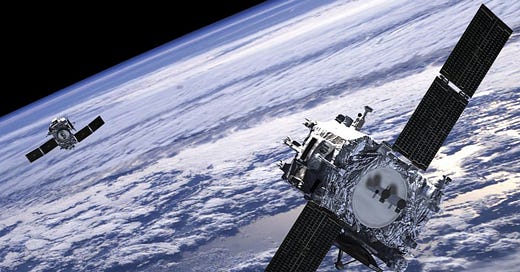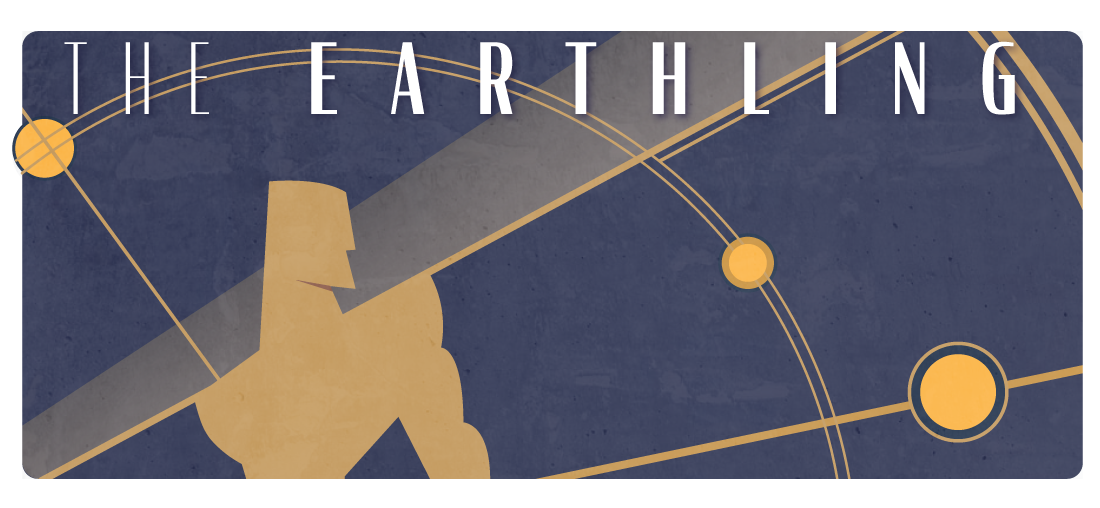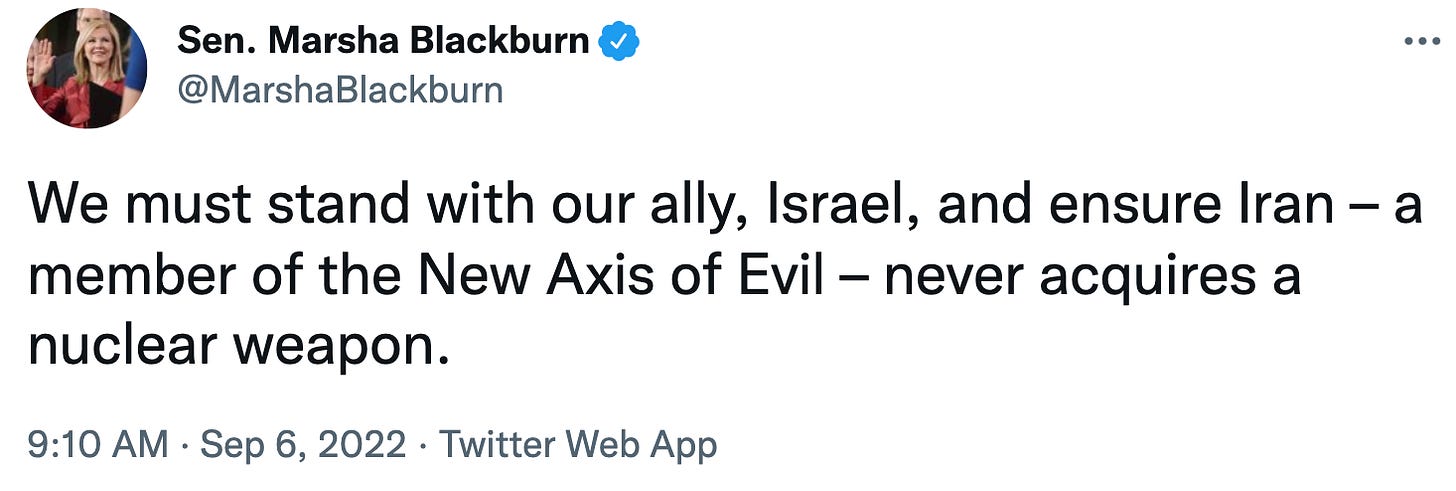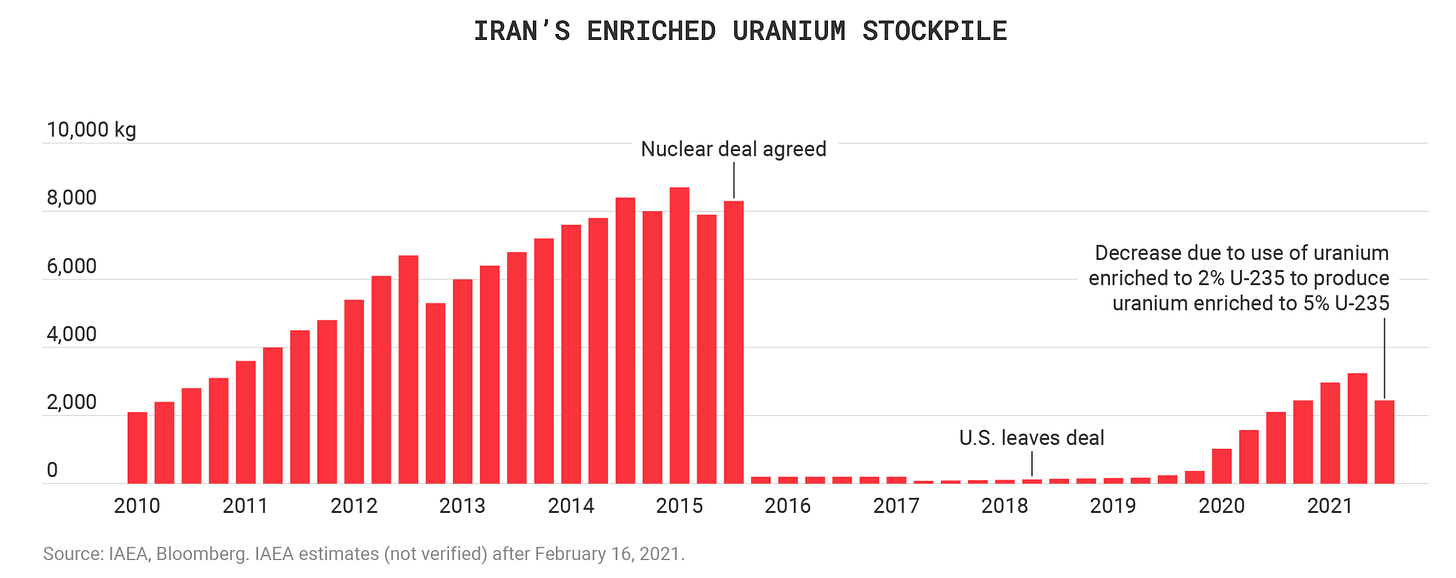Earthling: Anarchy in Outer Space
Plus: Marsha Blackburn’s Iran muddle, “doomsday glacier” gets doomier, why China’s troubles are so American, and more!
Is outer space becoming the new Wild West? Writing in War On the Rocks, Douglas Ligor of the Rand Corporation worries that it is, and says nations should cooperate to bring law and order to the final frontier.
In particular: Ligor says it’s time to begin the arduous political task of amending the 1967 Outer Space Treaty (sometimes called “the Magna Carta of Outer Space”), which lays out important principles but “offers few, if any, binding rules to regulate or punish conduct that may be deemed to be in violation of its articles.”
The accumulation of space debris and the continued testing of anti-satellite weapons are “perhaps the most prominent and painful examples of the failure of the current space governance framework,” writes Ligor. An anti-satellite arms race could eventually put much of humankind’s communications infrastructure at risk of sudden annihilation.
And (though Ligor doesn’t get into this), leaving aside the massive economic dislocation accompanying such a catastrophe, and the large-scale military conflict it would presumably be part of, the attendant loss of surveillance capabilities could prove apocalyptic; nuclear powers suddenly deprived of their eyes in the sky can overreact to sketchy evidence suggesting that a nuclear-armed rival is preparing an attack or launching one.
And, on a less apocalyptic and more immediate note: Anti-satellite tests can create more space debris since they sometimes involve smashing a satellite to bits. Last year’s test by Russia created so much flotsam that the International Space Station took defensive measures.
Meanwhile, along with the growth in debris is growth in the number of fragile things debris can collide with. Over the next decade the number of satellites in space could easily triple, given the plans of countries like China and companies like SpaceX to launch thousands of satellites.
All of which leads to what are known as the “three C’s”—three trends that will make outer space an increasingly explosive place unless Earthlings take action: Outer space is increasingly congested, increasingly contested (the US, Russia, and China all consider space a war-fighting domain), and increasingly competitive (space may be effectively infinite, but the number of valuable satellite parking places is not, and they are in growing demand).
Though establishing law and order in space would benefit humankind broadly, there’s been little progress on this front over the past half century. And current geopolitical conditions aren’t auspicious. Ligor writes that “the increasing great-power competition between the United States, the People’s Republic of China, and the Russian Federation is making space more dangerous.”
Good news for Earthlings with low self-esteem! Apparently we are smarter than Neanderthals were. Scientists inserted a Neanderthal brain gene into mice, ferrets, and “mini brains” grown from human stem cells, and the resulting brains were slower to create neurons in the cortex. “Making more neurons sets the basis for higher cognitive function,” explained one of the researchers. “We think this is the first compelling evidence that modern humans were cognitively better than Neanderthals.”
Are the US and China so radically different that a “clash of civilizations” is in the cards? Or are they deceptively similar—and struggling to overcome the same basic internal problem? Writing in Noema, political scientist Yuen Yuen Ang argues the latter.
According to Yuen, China is experiencing a “Gilded Age”—a term normally associated with late-nineteenth-century, hyper-capitalist America; and the US is in a Gilded Age redux, with robber barons replaced by big-tech CEOs. Both countries are struggling to curb attendant problems, such as corruption and severe economic inequality.
Yuen’s analysis suggests that the standard framing of the geopolitical rivalry between China and the US is misleading. “If there is a race,” she writes, “whichever nation ‘wins’ is the one who avoids self-inflicted wounds and makes capitalism work for the common good rather than for a small sliver of super-elites.”
President Biden this week told Israeli Prime Minister Yair Lapid that re-entering the Iran nuclear deal is off the table, at least for now, the Times of Israel reports. Israeli leaders have vocally opposed reviving the accord, which would provide sanctions relief to Iran in exchange for limitations on its nuclear energy program.
If the nuclear deal turns out to be dead, few people will be happier than Tennessee Senator Marsha Blackburn. An example of her recent commentary on the subject:
There are problems with Blackburn’s tweet. For one, the deal she opposes on grounds that it might let Iran acquire a nuclear weapon was, while in effect, demonstrably doing the opposite:
Nuclear proliferation expert Nicholas Miller points to another problem with Blackburn’s framing:










